David J. Howe's Blog, page 5
April 22, 2024
Review: The Monster Man
 The Monster Man is the latest release from Keith Barnfather and Reeltime Pictures, and as usual it's a slick and professional production.
The Monster Man is the latest release from Keith Barnfather and Reeltime Pictures, and as usual it's a slick and professional production.Superbly edited by Roger Stevens, the production focusses on Neil Cole, the creator and proprietor of the Museum of Classic SciFi based in Allendale, England, and his work restoring old screen-used props and costumes for display.
The love and work that goes into these projects become evident as Cole, an engaging and interesting character, introduces us to his top ten restorations ... and the amazing work that goes into them becomes apparent. He receives through the post a hand from an '80s Doctor Who monster, The Destroyer, to display - he already has the matching hand! He works on a Bannerman, on the Garm, both from Doctor Who, on a Thing mask from The Fantastic Four ... large and small, Cole is so enthusiastic about his passion, and that enthusiasm rubs off on the viewer.
There's so much to see inside the crammed cases of the Museum - I have visited and know how small a space it really is - and at one point Cole mentions there are more than 300 items on display! And many more in storage which he cannot fit in - so I assume he constantly cycles them and keeps the museum interesting for repeat visitors.
As the top ten comes to a conclusion, you feel an affinity with Cole and his passion. What he has done is incredible as virtually a one-man operation, and the battles he has fought with the local council have been ridiculous and painful as they attempted to use his Museum as a political football ... whereas in fact it's probably drawn more footfall and custom to Allendale through café and food sales and guest house bookings than anything else.
Overall the DVD is exceptionally entertaining. Barnfather and Stevens never forget that this is meant to be fun, and the production takes a potentially dry subject and turns it into an exciting and compelling documentary, which would be right at place on any streaming service or official Blu-Ray release.
The DVD is available to buy or to stream from: https://timetraveltv.com/programme/593
April 21, 2024
Review: Cover B by Will Brooks
 Will Brooks is something of a legend! For several years he was the artist on 'Cover B' for all the Titan Doctor Who comic releases. For those not in the know, Titan released all their Doctor Who comics with multiple covers from different artists - basically making it impossible to collect them all. Indeed, the first issue of their first Tenth Doctor comic had 40 or so different covers, many exclusives to one store or retailer or another ... so utterly impossible to get them all! 'Cover B' was the photo cover, and the one that Brooks did each time.
Will Brooks is something of a legend! For several years he was the artist on 'Cover B' for all the Titan Doctor Who comic releases. For those not in the know, Titan released all their Doctor Who comics with multiple covers from different artists - basically making it impossible to collect them all. Indeed, the first issue of their first Tenth Doctor comic had 40 or so different covers, many exclusives to one store or retailer or another ... so utterly impossible to get them all! 'Cover B' was the photo cover, and the one that Brooks did each time.Brooks has collected all these covers into a lovely hardback and paperback book which was kickstarted last year and which arrived a couple of weeks ago - the book is still available via the kickstarter as 'late pledges' here: https://www.kickstarter.com/projects/1666382001/cover-b
What is so great about Brooks' work is that in most cases there's a dynamic about the art which is often missing in other 'cut it out and slap it together' pieces of photoshop. He crafts stories into the pieces, and, even though relying on photographs, they are stitched together, Frankenstein-like, to create new pieces. A hand from there, a body from here, a watch from somewhere else, a background taken on holiday, a photo of an eye from over there ... all to create a magnificent coherent ensemble image which looks as real as if it was photographed as it actually appeared!
Along the way Brooks details the story of how he came to be involved, and the trials and tribulations of trying to create this art against a backdrop of BBC Licensing, who seemed to not understand what he needed. They starved him of key photographs, and came back with late requests to remove items, monsters and so on ... all of which added to the general adversity of creating effective cover art for a licensed magazine. One strange request was that the 13th Doctor, Jodie Whittaker, should never be seen as threatened ... so she had to appear on her own or with her 'fam' - no monsters allowed to be there ... which lead to a fairly boring set of images, all of which seem to be straight out of the PR folder.
But Brooks tried. No Daleks to be used in the early years ... no Zygons permitted ... ideas scuppered ... whole covers created and then scrapped ... it's quite the horror story. And Brooks also mentions how the pay decreased over time as well ... less and less being spent, until Titan changed editors and the 'new guard' decided that they didn't want to pay anyone external for doing a photo cover and brought it all in house. End of an era.
Luckily, said era is documented, described and beautifully illustrated in this book. We have rough covers: cut and pastes of pictures to show alignments and basic ideas. Unused covers, covers which form sequences and conceptual work showing scenes you'd never quite imagine. It's quite the tour de force.
A remarkable art book of Doctor Who imagery all created by one man! It's a triumph!
February 16, 2024
New Doctor Who Vinyl for Record Store Day 2024

“We are at the very beginning…”
Demon Records presents, exclusive to Record Store Day 2024, the complete narrated TV soundtrack of the Doctor Who story ‘The Edge Of Destruction’. This brand new audio presentation, making its debut in any format with this vinyl release, features unique linking narration by Carole Ann Ford. There’s also a bonus interview with Carole herself, in which she recalls playing Susan, the Doctor’s granddaughter, in the original TV episodes.
The vinyl boasts a picture disc Side A, showing the Ship’s melting ormolu clock from a pivotal scene in the story, and an exclusive Zoetrope Side B, depicting the TARDIS swirling across space and time (best experienced using a smartphone running a third party stroboscope app). The 12” disc is presented in a stunning die cut artwork outer sleeve.

Escaping from their previous adventure, the Doctor, Susan, Ian Chesterton (William Russell) and Barbara Wright (Jacqueline Hill) are inside the TARDIS when it appears to be taken over by an outside force. 2024 is the 60th anniversary of this two episode story starring William Hartnell as the Doctor. First broadcast on 8 & 15 February 1964, it was only the third ever Doctor Who serial to be transmitted.
Doctor Who returns to BBC TV and Disney+ in Spring 2024 with Ncuti Gatwa in his first full series as the Fifteenth Doctor.
Side A
The Edge Of Destruction
Side B
The Brink Of Disaster
CAT NO: DEMREC1190
RELEASE DATE: 20th April 2024
FORMAT: Zoetrope Picture Disc
BARCODE: 5014797910898
February 9, 2024
REVIEW: NEW DOCTOR WHO TARGET BOOKS
At the end of 2023 we had the enjoyment of seeing four new Doctor Who adventures on telly ... three with the Doctor in the form of David Tennant (again) and one with the brand new Doctor in the form of Ncuti Gatwa ... and sure as salt, the novelisations of the adventures appeared. First on Kindle, and then in paperback and hardback (for the Gatwa one only).
I have a long association with the Target Doctor Who novelisation line. First as a reader, then as a collector, then as a chronicler (researching and writing The Target Book (www.telos.co.uk or Amazon where you live), and now penning the liner notes for the audio readings of the old novelisations. So turning my attention to some new fare was exciting indeed.
 The Star Beast by Gary Russell
The Star Beast by Gary RussellFirst off is The Star Beast. On TV this was a bit of a run-around with aliens and explosions and franticness as the Doctor and Donna become reacquainted, meet Beep the Meep, and figure out what's going on all in the space of an hour. The story is based on a comic adventure from way back, and Russell T Davies has reinvented it for the small screen. It seems that Gary Russell has then sort of backwards finessed it and included more from the original comic ...
But the book is a nice read, if a little unadventurous. The characters are all there, and, as in the CD liner notes I tend to look at what has been added/changed for each book, there's some nice new material about a character called Stew Ferguson which adds interest and humanity to the proceedings.
I also like to see how the Doctor is described ... and here we have 'a tall, thin guy in a long blue coat ... his brown hair blowing slightly in the breeze' which is an excellent thumbnail of the 14th Doctor.
Overall it's enjoyable and rattles through the breathless adventure with aplomb ... good job.
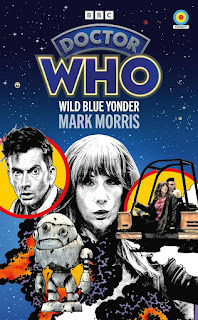 Wild Blue Yonder by Mark Morris
Wild Blue Yonder by Mark MorrisThe middle of the three 14th Doctor adventures, and a slight change of tone and pace as the Doctor and Donna find themselves on a vast spacecraft at the edge of the universe ... with a mystery to be solved.
Mark Morris follows the TV story pretty closely here (and I note he has mentioned online that this was indeed the brief) and he does a superb job of bringing this slightly atypical story to the page. There are only two characters in it (the Doctor and Donna), and they find themselves being mimicked by an alien entity/two entities while a stumpy robot walks, one step at a time, very slowly, down a long corridor ...
I enjoyed the prose here and there's some smashing descriptions which really bring the visuals to life. The prologue with Isaac Newton is included, and I still find it odd - not having anything to do with anything else in the story - but having more prose is not a problem!
I do feel that there's perhaps an element of foreshadowing missing, in that the final story, The Giggle, alludes back to actions taken here ... and it might have been nice to have teased a little ... but the story stands up nicely. I liked the idea of numbering the chapters using the alien words as well.
And the Doctor? We get 'a skinny man in an oddly patterned, tight fitting suit whose hair stuck up at odd angles.' Very nice.
Overall I found it more satisfying than The Star Beast. Mark Morris' writing flows and provides an enjoyable experience as we explore the mystery with the characters ... and not giving anything away must have been challenging to achieve in prose.
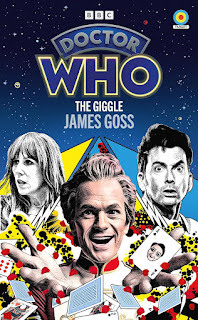 The Giggle by James Goss
The Giggle by James GossThe final book of the 14th Doctor's stories is The Giggle, and this is in a different realm. What's perhaps most interesting is that Morris was apparently told he couldn't embellish the story over what was on TV, whereas Goss does nothing but. And the book is far better and richer for it.
So the third adventure sees the return of the Toymaker from a Doctor Who story from 1965, played by Neil Patrick Harris, and is another change of tone as the character is set on challenging the Doctor to more games to try and even the score ... and it's the Doctor's liberal use of salt at the end of the universe in Wild Blue Yonder which allowed this to happen.
The novelisation opens with a recap from the end of Wild Blue Yonder and it was interesting to see the slight variation of text between Morris and Goss in this regard, but from there we launch into the story as seen on TV ... the Toymaker with his cod Germanic accent, Stooky Bill, the chaos on Earth, UNIT Tower and so on ... but the text is peppered with odd phrases ... something is afoot. And that something is the Toymaker, who has actually invaded the book, and eventually he emerges to take over the tale himself ... and the book is crazed fun.
There are word puzzles and mazes along the way. On TV when Donna is separated from the Doctor in the corridors of doors, in the book it becomes a 'make your own adventure' with 'To try the first door, go to move xxx' or whatever (the text echoing the Doctor playing the Trilogic Game in the original sixties story) ... great fun. I read through the book consecutively, so arrived at the little piece which you don't get to if you play the game properly ... another nice conceit.
The section where the Toymaker dances in UNIT HQ to The Spice Girls singing 'Spice Up Your Life' is interesting ... rather than as on TV, we have here a discussion with a copyright lawyer as to why the lyrics cannot be used, followed by a manic sequence where the words are omitted and replaced with Las instead ... a neat way of getting around the vast expense of reproducing lyrics in print ...
Overall the book is joyous fun ... it oozes from every page ... and makes the most of the prose form to deliver the adventure to the reader. In the audio reading of the novelisation, Goss has changed it again, and the puzzles which work in the book in printed form are changed to audio equivalents ... clever and nicely done.
And the 14th Doctor: there's not much description at all. Skinny. Hair ready to run for the hills. But no general description.
For the 15th Doctor: He's young. Handsome. Dark skin. That's it. But then this is from the Toymaker's point of view, so maybe that accounts for it. (As on TV Mel thinks he's beautiful and Donna asks if he comes in a range of colours.)
Overall this is a great example of a book which takes the translation of a story into prose and runs with it. It's frantic, exciting and so much fun! Easily the best of the four novelisations.
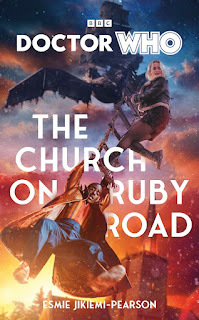 The Church on Ruby Road by Esme Jikiemi-Pearson
The Church on Ruby Road by Esme Jikiemi-PearsonAnd so to the last of the four, and the only one in hardback. While this says it's a Target book on the inside flap, there is no logo and no other indication that this is what it is ... maybe the eventual paperback will follow the more accepted format.
Anyway, this seems to be the second book from the author (this came out on Jan 25 whereas her 'debut' novel, The Principal of Moments, came out on Jan 18, but her PR suggests she's 'the Sunday Times Bestselling author of the The Order of Legends trilogy' ... which I can't find any reference to ... unless Principal is perhaps the first volume in this trilogy?) and it's good to see someone new writing for the Doctor Who range.
It's another novelisation which sticks close to the screenplay, but here the author has a lightness of touch to the prose which is very pleasing. By telling it (mostly) through the viewpoint of Ruby Sunday, we get a sense that she is a real person thrust into unreal situations, and it all works nicely, feeling warm and fluffy when you need it to. The descriptions are good, with some effective material around the goblin ship and its inhabitants, and although the book seems slight, it does cover all the ground. There's even a nice back-reference to The Giggle and the Toymaker to explain the goblins as being part of his legacy.
In terms of the Doctor ... well sadly it seems that Jikiemi-Pearson forgot to describe him. He has brown eyes, a long brown coat, 'a galaxy lived on his skin' (love this description by the way), strong arms ... but otherwise he's just 'the man' in the early parts before he's called the Doctor. I guess you could easily read the book with the fourth Doctor (Tom Baker) in your mind if you wanted to and it wouldn't make much difference as the same 'teeth flashing white' note applies there as well.
Overall I enjoyed the book, but compared with The Giggle, it's not nearly as much fun (but then not much would be). As a proper introduction to the 15th Doctor it also falls a little flat as there's nothing really here to make him stand out. But the writing is eloquent, and there's a deftness to it all. Enjoyable.
And one more thing: the final words from the mysterious Mrs Flood (no clues here) are clearly spoken to herself and not to Abdul or the audience ...
December 28, 2023
Review: Doctor Who: The Church on Ruby Road
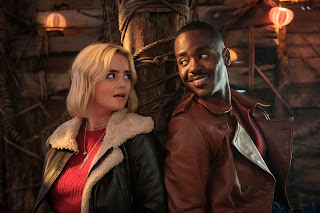 A Christmas Special! A new Doctor! A new Companion! And a new era for Doctor Who!
A Christmas Special! A new Doctor! A new Companion! And a new era for Doctor Who!It can always be quite daunting when a new Doctor arrives, and in this case, it's probably more than usual as here we have a Doctor without any 'baggage', a new bi-generated Doctor, newly created, and having left all his angst, past, tiredness and issues with his previous self - allowing the Doctor as a whole to heal on Earth with a new 'family'. And here we have Ncuti Gatwa as the 15th Doctor ... in his first proper adventure since he split from his previous self. It's a great way to reboot the show for (another) new audience and to bring it all up to date for the rest of its 7th Decade.
There's a lot going on here of course, and a lot to enjoy and appreciate. And as it's a Christmas Special to boot, there's that element to try and include as well ...
 The whole Christmas thing is perhaps of the least impart here: it happens to be new companion Ruby Sunday's birthday, and there's a church, and snow on the ground, and Christmas decorations all around of course ... but it has (or seems to have) no bearing on the actual plot.
The whole Christmas thing is perhaps of the least impart here: it happens to be new companion Ruby Sunday's birthday, and there's a church, and snow on the ground, and Christmas decorations all around of course ... but it has (or seems to have) no bearing on the actual plot.The plot is fairly simple: Ruby Sunday (Millie Gibson) is now 18 years old, and she was discovered outside a church on Christmas Eve. She was taken in by a foster family and named Ruby (after the name of the street that the church was in). Now she's finding that she has hit a rash of bad luck as a load of time-bimbling goblins have decided to make her unlucky (and those she encounters) as prelude to taking another baby (called Lulu-Belle) on Christmas Eve in order to feed it to the Goblin King.
The Doctor (Ncuti Gatwa) has become aware of Ruby's bad luck and is trailing her ... popping up in a nightclub where she plays piano/synth on stage, and in a club where she's having a drink, as well as at her house. So when the goblins move in and kidnap the baby, he's ready for them, and he and Ruby head up a ladder to the goblin ship which is flying overhead, to rescue the baby and bring them back to Earth safely.
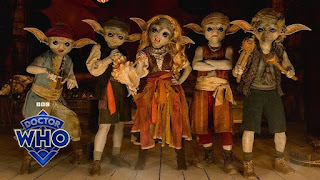 However, the goblins have other ideas, and bimble back 18 years and kidnap Ruby as a baby instead! This changes time, and in the present, suddenly only the Doctor remembers Ruby. So he heads back in time to rescue her from being eaten, and crashes their ship by pulling it down onto the spire of the church where it pierces (and presumably kills) the Goblin King.
However, the goblins have other ideas, and bimble back 18 years and kidnap Ruby as a baby instead! This changes time, and in the present, suddenly only the Doctor remembers Ruby. So he heads back in time to rescue her from being eaten, and crashes their ship by pulling it down onto the spire of the church where it pierces (and presumably kills) the Goblin King.Ruby reappears in the present day, everyone has their memories back and time is back on course, so the Doctor 'entices' Ruby to leave with him. But who is the mysterious Mrs Flood (Anita Dobson), the next door neighbour, who knows that the Doctor's ship is a TARDIS (but who seemed taken aback to see it materialise and dematerialise). Who is Ruby's real mother, and why did they leave her on the steps of the church 18 years ago. Why does Ruby's family have a working instant camera, complete with film? (they are quite expensive in 2023, as is the film for them ... how can the family afford that?) Why does no-one seem to have a mobile phone?
 Another concern is that in this episode the Doctor does something that I'm not 100% sure he has ever done before - go back in time specifically to change history back again ... usually, as with Adric's death, or the bloody human sacrifice habit of the Aztecs, for example, he says he cannot do this. Maybe this is part of the new unbaggaged Doctor's make-up ... but then the 10th Doctor's attempt to correct history in 'Waters of Mars' was all part of the Doctor starting to go insane and believing he was some sort of unstoppable god! Here, though, the goblins had already changed it, and he was just changing it back again, so maybe that's okay then (as the Toymaker might say).
Another concern is that in this episode the Doctor does something that I'm not 100% sure he has ever done before - go back in time specifically to change history back again ... usually, as with Adric's death, or the bloody human sacrifice habit of the Aztecs, for example, he says he cannot do this. Maybe this is part of the new unbaggaged Doctor's make-up ... but then the 10th Doctor's attempt to correct history in 'Waters of Mars' was all part of the Doctor starting to go insane and believing he was some sort of unstoppable god! Here, though, the goblins had already changed it, and he was just changing it back again, so maybe that's okay then (as the Toymaker might say).But it's a minor point and the episode is hugely enjoyable, due in no small part to the performances of Gatwa and Gibson ... very endearing and well cast, with the Doctor having bags of charisma and a smile to die for ... as well as the much needed gravitas (or should that be mavitas - I noticed that mavity was referenced again in the story) needed to bring the character to life.
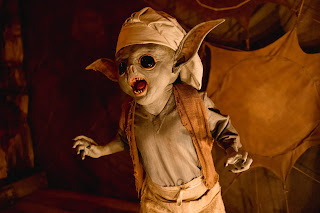 The goblins are interesting, and I liked that writer Russell T Davies gave them a scientific basis rather than just complete fantasy ... the idea that their technology is based around the science of luck and coincidence, as well as the language of ropes is fascinating and added a lot to the wonder of the tale. Their realisation is also very well done ... I originally thought they might have been all CGI, but no, they're actually twelve performers (including Rachelle Beinart who played Po in Tellytubbies!) with amazing prosthetics and make-up ... and then there's the Goblin King, an incredible giant animatronic monster ... simply brilliant!
The goblins are interesting, and I liked that writer Russell T Davies gave them a scientific basis rather than just complete fantasy ... the idea that their technology is based around the science of luck and coincidence, as well as the language of ropes is fascinating and added a lot to the wonder of the tale. Their realisation is also very well done ... I originally thought they might have been all CGI, but no, they're actually twelve performers (including Rachelle Beinart who played Po in Tellytubbies!) with amazing prosthetics and make-up ... and then there's the Goblin King, an incredible giant animatronic monster ... simply brilliant!One thing that's great about the current 'version' of Doctor Who is that when people pick on elements to criticise, you can usually find another example (or more) from earlier eras of the show. So if you didn't like the goblin sailing ship in the sky, then look to 'Enlightenment' with its space-bound schooners piloted by the Eternals; if the idea of the Doctor having gravity/mavity gloves worries you, then look to the Doctor using his sonic to calm Aggedor (in 'The Curse of Peladon'), or any number of other esoteric devices invented by the third Doctor; if Mrs Flood addressing the camera at the end was a problem, then look to several other instances of the Doctor and others doing the same - and of course the most famous line from the Doctor in 'The Feast of Steven' episode of 'The Daleks' Master Plan' where he broke away to wish a Happy Christmas to everyone at home! If you thought the Doctor bursting into song was strange ... well ... you may have a point. I quite liked the goblin song, though it keeps niggling me that I know the tune from something else. But the Doctor and Ruby also launching into a bit of song and dance seemed somewhat far fetched. But then again, the same thing happened way back in 'The Gunfighters' where the Doctor's companions had a bash at 'The Ballard of the Last Chance Saloon'. Even the Doctor's opening monologue harks back to stories like 'The Deadly Assassin'.
 So there's precedents for many elements which I have seen people talking about online. But then we have other things too: spearing the lead monster with the top of a church spire is very similar to the way the Great Vampire was despatched in 'State of Decay'; the 'family unit' and the way they are introduced and integrated realistically is very reminiscent of Rose and her family from 2005 (a speciality of Davies seems to be writing these characters as real and believable); and of course goblins stealing a baby is straight out of the film Labyrinth.
So there's precedents for many elements which I have seen people talking about online. But then we have other things too: spearing the lead monster with the top of a church spire is very similar to the way the Great Vampire was despatched in 'State of Decay'; the 'family unit' and the way they are introduced and integrated realistically is very reminiscent of Rose and her family from 2005 (a speciality of Davies seems to be writing these characters as real and believable); and of course goblins stealing a baby is straight out of the film Labyrinth.The Doctor presumably killing all the goblins and their King though ... that's not very Doctor-like. I wonder if they were killed though, or whether they were banished back to whatever reality/time they had bimbled in from ...
Overall then, a good Christmas episode which bodes well for the future. Doctor Who is dead! Long live Doctor Who!
December 10, 2023
Review: Doctor Who: The Giggle (2023)
 Whoah! There's a lot to unpack here. The third and final of the David Tennant/14th Doctor Specials for this year, 'The Giggle' promised a rematch with the Toymaker, who first appeared way back in 1966 in the story 'The Celestial Toymaker'. He was played by Michael Gough then, as a suave, controlled presence ... a supremely powerful entity, bored, and existing to play games ... he existed in his own realm, and if you beat the Toymaker, then the realm was destroyed, but the Toymaker existed on ... creating another realm. If you played his games and lost, then you became one of his toys ... doomed to spend an eternity playing his games.
Whoah! There's a lot to unpack here. The third and final of the David Tennant/14th Doctor Specials for this year, 'The Giggle' promised a rematch with the Toymaker, who first appeared way back in 1966 in the story 'The Celestial Toymaker'. He was played by Michael Gough then, as a suave, controlled presence ... a supremely powerful entity, bored, and existing to play games ... he existed in his own realm, and if you beat the Toymaker, then the realm was destroyed, but the Toymaker existed on ... creating another realm. If you played his games and lost, then you became one of his toys ... doomed to spend an eternity playing his games.And we'll come to the Toymaker.
Let's look at the other aspects of the story first. I think there's so much going on that the show is in danger of imploding. Compare this with pretty much any story from the Jodie Whittaker era and the difference is marked. They were for the most part one-note moralistic pieces, designed to deliver a 'message' ... and on the whole they did that very well, though the adventure and incidentals were lacking. Here though we have multifaceted complex pieces, where the characters all spin around each other ...
 Take UNIT for example. Rather than being a secret organisation as in the seventies, here they are an up front and obvious military presence, with a base on top of a huge tower block in London. They have access to alien tech - the strange robot thing Vlinx - which actually added nothing to the story. Likewise the Doctor's old companion Mel is here ... but why? She adds nothing to the story. Take her away and the story is unchanged. They even get the little details wrong: Mel was not the first redhead to travel with the Doctor ... what about Turlough? Or even Vicki (the actress Maureen O'Brien seems to have had red hair in in her younger days) or even Liz Shaw? Then there's Kate Lethbridge-Stewart, still in charge, and still back-referencing her dad at every turn.
Take UNIT for example. Rather than being a secret organisation as in the seventies, here they are an up front and obvious military presence, with a base on top of a huge tower block in London. They have access to alien tech - the strange robot thing Vlinx - which actually added nothing to the story. Likewise the Doctor's old companion Mel is here ... but why? She adds nothing to the story. Take her away and the story is unchanged. They even get the little details wrong: Mel was not the first redhead to travel with the Doctor ... what about Turlough? Or even Vicki (the actress Maureen O'Brien seems to have had red hair in in her younger days) or even Liz Shaw? Then there's Kate Lethbridge-Stewart, still in charge, and still back-referencing her dad at every turn.The devices they wore to ward off the effects of 'the giggle', this Zeedex thing ... In 1968's 'The Invasion', when the Cybermen invasion began, people avoided being impacted by the Cyber-control signal by wearing neuristers on the back of their necks, and UNIT took a supply of them to Russia and elsewhere to stop the people there being affected. So why couldn't UNIT ensure that at least the heads of government were supplied with and wore the Zeedex devices - despite the very familiar anti-news propaganda about them?
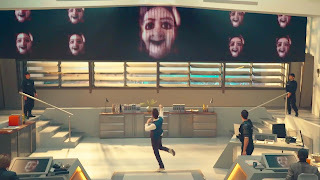 This was the very clever element of the episode: turning a spotlight on ourselves as fans, and asking the hard questions about society in the 2020s. They even addressed the fact that UNIT scientific adviser Shirley Bingman could stand, even though she used a wheelchair ... something that some quarters of fandom complained about as well after her appearance in 'The Star Beast'. Russell T Davies must have been silently cheering when fandom took against elements like this, when he had already covered/predicted it in the forthcoming episodes!!
This was the very clever element of the episode: turning a spotlight on ourselves as fans, and asking the hard questions about society in the 2020s. They even addressed the fact that UNIT scientific adviser Shirley Bingman could stand, even though she used a wheelchair ... something that some quarters of fandom complained about as well after her appearance in 'The Star Beast'. Russell T Davies must have been silently cheering when fandom took against elements like this, when he had already covered/predicted it in the forthcoming episodes!!And the idea that everyone thinks they're right. Acutely explaining the total lack of empathy that so called 'leaders' like Trump and Johnson have, and that their followers mindlessly exploit ... 'I am right and therefore you must be wrong' ... endlessly repeated through online posts, blogs, comments and texts without any come back or actually having to say the same to real people. Keyboard warriorism at its most toxic. And THIS is what Doctor Who has always done: held a mirror up to real life and asked 'What If'. Recently the series Black Mirror has become the primary touchstone for 'What If' storytelling, but in Doctor Who terms reference the threat from the rise of technology in 'The War Machines' and 'The Tenth Planet', world food shortages in 'The Seeds of Doom', global Ice Ages in 'The Ice Warriors', pollution in 'The Green Death', the Common Market in 'The Curse of Peladon' and the miners strikes in 'The Monster of Peladon'. Also soulless high rise buildings in 'Paradise Towers', happy happy Conservatism threat in 'The Happiness Patrol' and even the issues of diesel cars and air pollution in 'Gridlock' ... it's riddled through the history of Doctor Who and is nothing new.
These are all great elements ... and they make UNIT seem more cohesive, even if Mel and the unexplained alien robot thing are totally surplus to requirement ... But where is Torchwood in all this? They seem to have been conveniently forgotten.
And now ... to the Toymaker, as promised.
 Bringing back old enemies has not been the forte of Nu-Who. They tend to screw them up and get them wrong at every turn, inventing new ideas and story for them, and often ignoring or forgetting what made them great and memorable in the first place. Cybermen became Cybus-Men, robot people created by Lumic in an alternative universe. Silurians lost their third eye and most of their culture (female reptiles with breasts?). Sontarans were reduced to comedy fodder. Ice Warriors were de-armoured, de-hissed and reduced to troops for a new queen (in all fairness this happened too with the Daleks once Davros was introduced) ... so there's not a good history with bringing old enemies back into the show. Even the Master came back as some lunatic madman rather than the quiet evil presence he had previously been.
Bringing back old enemies has not been the forte of Nu-Who. They tend to screw them up and get them wrong at every turn, inventing new ideas and story for them, and often ignoring or forgetting what made them great and memorable in the first place. Cybermen became Cybus-Men, robot people created by Lumic in an alternative universe. Silurians lost their third eye and most of their culture (female reptiles with breasts?). Sontarans were reduced to comedy fodder. Ice Warriors were de-armoured, de-hissed and reduced to troops for a new queen (in all fairness this happened too with the Daleks once Davros was introduced) ... so there's not a good history with bringing old enemies back into the show. Even the Master came back as some lunatic madman rather than the quiet evil presence he had previously been.And sadly the same happens here. Rather than the rather serene and noble Gough, a bored immortal entity getting his kicks from playing games, and almost quite enjoying when he lost, we have Neil Patrick Harris playing some batshit mad character. His cod Germanic accent was perhaps acceptable at the beginning, but he was MUCH more threatening when he dropped it to a flat English accent. Less is far more in this case.
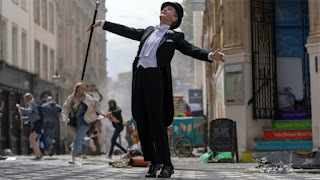 Also, once the Doctor knew his identity, why bother continuing the charade of being a German Toymaker? There was no point ... he should have reverted to playing it straight and quiet. And being a calculating, amoral threat, looking for the next game, and the next, just to keep him from being bored.
Also, once the Doctor knew his identity, why bother continuing the charade of being a German Toymaker? There was no point ... he should have reverted to playing it straight and quiet. And being a calculating, amoral threat, looking for the next game, and the next, just to keep him from being bored.I have been criticised in the past of reviewing based on what I think the show should have done rather than what it did do, so let me say I loved what it did do ... it's just that (and this is in common with so many of my reviews of Russell T Davies' episodes in the past), he misses a trick, doesn't do things which would - in my view - have been so much better and satisfying as a story.
The original Toymaker story had the companions playing a sequence of games to try and 'win' the TARDIS back against some of the Toymaker's trapped previous opponents. Whereas the Doctor had to win at the Trilogic Game (being made invisible for some of it to boot), with a final kicker, that when the Doctor made the final move, the Toymaker's world would be destroyed, and the Doctor along with it - but if the Doctor was not in the world, he couldn't make the move. A neat little final conundrum that the original story found a neat and satisfying way around.
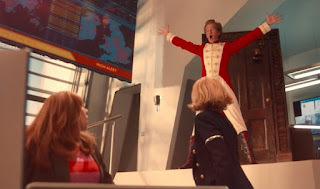 Similarly, rather than the running around through corridors of doors with Donna (and them getting split up was just stupid - we shouted at the screen at that point!) we could have had a different puzzle/game in each room that they had to win to progress. But then the final game ended up as a game of catch. That for me was too simple. It should have been something designed by the Toymaker to be a win win for him, but which the Doctor (or two Doctors) finds a loophole and wins instead. That would have been far more satisfying a solution. But that's not what we got. It was replaced with the Toymaker dancing his way through UNIT HQ to the sound of the Spice Girls singing 'Spice Up Your Life' and turning bullets into flower petals, and then a game of catch ...
Similarly, rather than the running around through corridors of doors with Donna (and them getting split up was just stupid - we shouted at the screen at that point!) we could have had a different puzzle/game in each room that they had to win to progress. But then the final game ended up as a game of catch. That for me was too simple. It should have been something designed by the Toymaker to be a win win for him, but which the Doctor (or two Doctors) finds a loophole and wins instead. That would have been far more satisfying a solution. But that's not what we got. It was replaced with the Toymaker dancing his way through UNIT HQ to the sound of the Spice Girls singing 'Spice Up Your Life' and turning bullets into flower petals, and then a game of catch ...
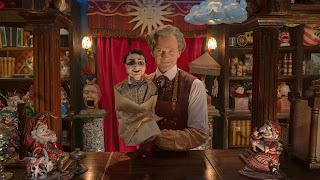 We had all this explanation in the story as well: as to how and why Baird's assistant got turned into a puppet ... and indeed the implication that the Doctor was the Toymaker's puppet all along ... not sure how though. The idea that the Doctor sprinkling salt and evoking superstition at the universe's edge (in 'Wild Blue Yonder') somehow brought the Toymaker to Earth in 1925. But what was Stooky Sue and her bairns doing there? Were they people who had become trapped as well? And that scene was stolen straight from the film Barbarella, where Jane Fonda is attacked by an army of biting automated dolls.
We had all this explanation in the story as well: as to how and why Baird's assistant got turned into a puppet ... and indeed the implication that the Doctor was the Toymaker's puppet all along ... not sure how though. The idea that the Doctor sprinkling salt and evoking superstition at the universe's edge (in 'Wild Blue Yonder') somehow brought the Toymaker to Earth in 1925. But what was Stooky Sue and her bairns doing there? Were they people who had become trapped as well? And that scene was stolen straight from the film Barbarella, where Jane Fonda is attacked by an army of biting automated dolls.After all this, the Toymaker is defeated. And the Doctor says he's banished 'from existence forever' which actually means he never existed, ever, so the battle/episode could never have taken place, and the Doctor never bigenerated. Be careful with your words Doctor as they have power! But I think the show takes this to mean that we'll fold him up, pop him back in his box, and keep the box somewhere forever. Hmmm.
Except of course for his gold tooth, in which the Master is apparently trapped. Then, in exactly the same way as with his ring in 'Last of the Time Lords', a mysterious female-presenting hand picks up the tooth at the end ... so are we building to another Master regeneration in the new series at some point? Might this be the character played by the drag artist Jinxx Monsoon? Time will tell!
 And so this brings us on to the much-vaunted regeneration. And it's like nothing we've seen before. Here the Time Lord literally splits in two, leaving the 14th regeneration with all the angst and baggage and damage and pain and exhaustion of 60 years (show time, many billions of his own personal time) of constant running, and creating a 15th incarnation which is free of all that. Whole again. New. Renewed. Its a smashing idea and is really well handled by the script and the cast.
And so this brings us on to the much-vaunted regeneration. And it's like nothing we've seen before. Here the Time Lord literally splits in two, leaving the 14th regeneration with all the angst and baggage and damage and pain and exhaustion of 60 years (show time, many billions of his own personal time) of constant running, and creating a 15th incarnation which is free of all that. Whole again. New. Renewed. Its a smashing idea and is really well handled by the script and the cast.Ncuti Gatwa, from the second he appears on screen, owns it. He even overshadows David Tennant! But this is I feel a massive complement to Tennant's portrayal, that he can pull back the Doctor to a quiet, tired, exhausted Gallifreyan, and allow Gatwa to take full reign of the charisma and dynamism that the part demands.
 Even Gatwa's smile lights up the screen. Who cares that he's wearing only half the Doctor's costume and wins out playing catch in his underpants! It's the sheer joy of seeing him which floods from the screen. What a superb choice of actor from Davies ... shrewd, clever, forward thinking, and with endless possibilities. I loved it!
Even Gatwa's smile lights up the screen. Who cares that he's wearing only half the Doctor's costume and wins out playing catch in his underpants! It's the sheer joy of seeing him which floods from the screen. What a superb choice of actor from Davies ... shrewd, clever, forward thinking, and with endless possibilities. I loved it!In a coda we see that the 14th Doctor has decided (sort of) to settle down with his new family: basically Donna's family, with added Auntie Mel (still not sure why she was included. Great actress, dancer, singer though she is, they gave her nothing to do!). And the Doctor is still sneaking off to Mars with Rose, and New York with Mel ... so there are more adventures happening ... more perhaps to be seen. Do I detect a potential spin off working it's way in ... maybe. Is the cynic in me wondering that this might be an escape valve for if the Gatwa adventures don't work out ... that we can revert to Tennant again? Or is this Disney insisting on the development of a MCU-style approach to Doctor Who, with lots of spin off shows and potential avenues for exploration? Or maybe both or all or none. I have no inside knowledge.

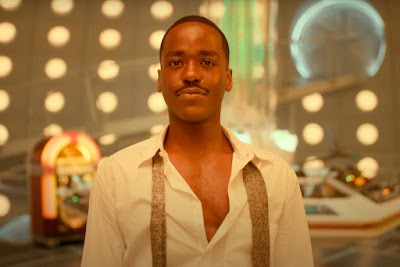
As a PS: I looked up Stookie Bill. It's the genuine name for a genuine vents doll that Baird used for his trial television transmissions. And yes, the story about it being too hot for humans, and the dummy head catching fire are also true!
In addition, 'Stookie' in Scots has various meanings ... here's what a page I found said (https://susantbraithwaite.com/2019/12/07/things-in-scots-7-stookie/):Other meanings for stookie/stooky:A plaster statueA slow-witted, dull personStanding motionlessTo hit hardHeadbutt (This isn’t in the Dictionar o the Scots Leid, but it was a common meaning when I (the writer of the blog) was a kid.)Stookies: A game where you have to stand like a statue while others prod, pull, and tease you into reacting. I (the writer of the blog) also remember a version where we ran around until the person who was “it” told us to freeze, and the first to move became “it.”
December 3, 2023
Review: Doctor Who: Wild Blue Yonder (2023)
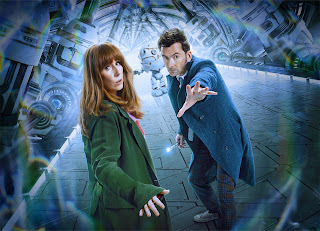 It's the second of the sixtieth Anniversary/Christmas Doctor Who specials for 2023, and already I'm feeling sad that we only (apparently) have three episodes/stories of the 14th Doctor and Donna to enjoy ... the pairing is so good, that you know that Gatwa and Gibson have very big boots to fill come Christmas Day.
It's the second of the sixtieth Anniversary/Christmas Doctor Who specials for 2023, and already I'm feeling sad that we only (apparently) have three episodes/stories of the 14th Doctor and Donna to enjoy ... the pairing is so good, that you know that Gatwa and Gibson have very big boots to fill come Christmas Day.A million years ago, I wrote a spin-off Doctor Who drama for Reeltime Pictures called Daemos Rising (available to buy here: https://timetraveltv.com/programme/480) I also wrote a second which remains unproduced called Face of the Fendahl. In both cases because these were low, tiny, zero, micro budget productions, and we couldn't afford hoards of extras, or even too many main actors, we had to make do with what we had, and so I fashioned the storyline so that we could have our stars playing 'evil' doubles of themselves ... who could try and trick the lead characters into thinking they were the real deal and thus win the game. This is not a million miles distant from what happens in 'Wild Blue Yonder'.
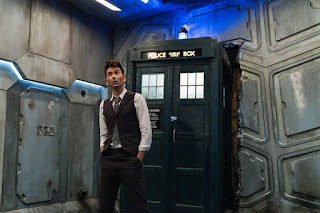 What's interesting is that for a 'special' episode the production team chose to take this approach. To forego lots of characters, for something which is very much a two-hander for the leads. In this way it is reflective of other low-cast episodes, like the opening episodes of 'The Mind Robber', 'The Ark in Space' and 'The Space Museum', or episode 3 of 'The Deadly Assassin' where the Doctor is up against Goth in the fantasy world of the Matrix. These episodes exist to explore the environment and the psyche of the lead characters as much as to entertain and set the scene.
What's interesting is that for a 'special' episode the production team chose to take this approach. To forego lots of characters, for something which is very much a two-hander for the leads. In this way it is reflective of other low-cast episodes, like the opening episodes of 'The Mind Robber', 'The Ark in Space' and 'The Space Museum', or episode 3 of 'The Deadly Assassin' where the Doctor is up against Goth in the fantasy world of the Matrix. These episodes exist to explore the environment and the psyche of the lead characters as much as to entertain and set the scene.The episode had no prepublicity at all ... zero ... not even any pictures. Apparently no advance screener copies were given to the news outlets as well ... all of which stoked up the anticipation as to what this episode might all be about ... and rumours were rife about cameos from old Doctors, the Master, the Daleks ... you name it ...
The Doctor and Donna arrive on a vast spaceship at some indeterminate point in time, hanging at the very edge of the known universe ... This place is huge, silent and empty. And very, very creepy.
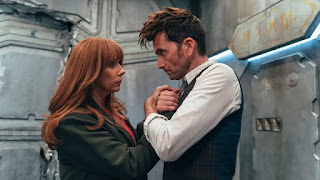 In order to up the anti, the Doctor has to put the TARDIS into repair mode, which he does by shoving the sonic screwdriver in the lock. At which point the TARDIS' HADS (Hostile Action Displacement System - first seen operating way back in 'The Krotons') kicks in, takes one look around, and promptly dematerialises the ship as it's not safe where it was. Sadly the Doctor and Donna were not in it, so they are now stranded on the vast alien ship.
In order to up the anti, the Doctor has to put the TARDIS into repair mode, which he does by shoving the sonic screwdriver in the lock. At which point the TARDIS' HADS (Hostile Action Displacement System - first seen operating way back in 'The Krotons') kicks in, takes one look around, and promptly dematerialises the ship as it's not safe where it was. Sadly the Doctor and Donna were not in it, so they are now stranded on the vast alien ship.They explore, and the camera seems to be watching them, perhaps stalking them ... they are being observed. but by what?
They find a vast open corridor full of sort of pistons and flashy lights. The floor extends away in both directions to darkness and the horizon. There's something way down away from them so they walk that way. A mechanical voice says 'Fenslaw' and the whole corridor shifts and moves, the panels and pistons going to a different configuration. Later it says 'Coliss' and the same thing happens.
Read more at: https://tvshowtranscripts.ourboard.or...
Farther down the corridor is a frozen human-sized but alien-looking robot. It is immobile. But then it takes a step forward and stops again.
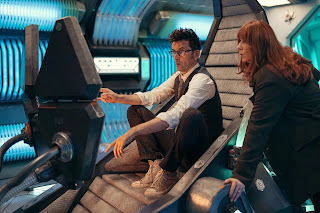 The mystery deepens. The Doctor and Donna find a control room with a more or less human-sized chair. Empty. There is however an odd occasional clang from outside the ship. Either side of the control room are two other areas. One contains strange slime-dripping rectangular sheets, the other contains pipes full of a blue liquid. The Doctor asks Donna to move all the rectangle things to the compartment above where they are while he looks at the liquid and tries to do something with it ...
The mystery deepens. The Doctor and Donna find a control room with a more or less human-sized chair. Empty. There is however an odd occasional clang from outside the ship. Either side of the control room are two other areas. One contains strange slime-dripping rectangular sheets, the other contains pipes full of a blue liquid. The Doctor asks Donna to move all the rectangle things to the compartment above where they are while he looks at the liquid and tries to do something with it ...And now, after all the mystery and intrigue, the plot kicks up a gear with the arrival of a Donna who isn't Donna and a Doctor who isn't the Doctor ... they, and the viewer, slowly realise that these facsimiles are not the real thing ... but what are they? What do they want? They seem intelligent but also have the memories of the originals ... are they creatures from the void who want to use the ship to head into the universe? Or something else entirely?
So now we're into good old fashioned Doctor Who monster territory as the creatures give chase, losing all control over their forms and size in the process. The Doctor and Donna head for another exit from the corridor but the ship sounds another word, 'Brate', and the infrastructure reconfigures around them, separating them.
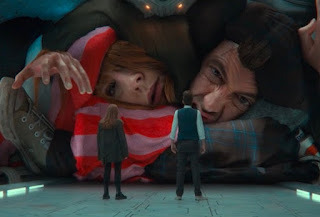 It's cracking good fun this one ... with more than a touch of films like Alien and Event Horizon, the ship is as much a character as the Doctor and Donna, and the threat is undefined, unknown, terrifying and utterly unimaginable. There's also a healthy dose of Russell T Davies' own television episode 'Midnight' here. In that story it was an unseen creature taking over the characters and repeating what they said until they overtook the victim and became them ... here we have physical and visible creatures which want to take over the Doctor and Donna ... but how are they doing it ... what is the secret?
It's cracking good fun this one ... with more than a touch of films like Alien and Event Horizon, the ship is as much a character as the Doctor and Donna, and the threat is undefined, unknown, terrifying and utterly unimaginable. There's also a healthy dose of Russell T Davies' own television episode 'Midnight' here. In that story it was an unseen creature taking over the characters and repeating what they said until they overtook the victim and became them ... here we have physical and visible creatures which want to take over the Doctor and Donna ... but how are they doing it ... what is the secret?I'm not going to give away the rest of the plot here as it is quite clever and benefits a viewer coming to it cold.
I loved the episode. It was riveting and nail-biting in all the right places. The Doctor and Donna cut off from the TARDIS and the Sonic Screwdriver and having to rely on the Doctor's wits to get them through ... with a new scary monster which can pretend to be you ... great stuff.
Finally, two other elements of the production: the opening, and the ending. The opening first. And it's an odd beast indeed. It reads like a sketch from some other show: the Doctor and Donna meet Isaac Newton (Nathanial Curtis), cause an apple to fall on his head and he then discovers gravity (except he calls it mavity). The writing of this sequence seems not as polished as the rest, and the tone is completely at odds with the actual episode. This leads me to surmise that it was perhaps added at the behest of some senior dignitary at Disney, who thought that the episode was not funny enough, and that it should really be about these silly skits in time where the Doctor meets historical characters and that all known history is because the Doctor interfered, either deliberately, or, as here, accidentally. It's a total mis-reading of what the show is actually all about of course, but I can't think of a better reason as to why it's here. There seems no point ... except to have a joke about gravity now being called mavity, and then Donna calling it that during the rest of the episode ... I dunno ... Maybe it's an alternate dimension version or something?
It could, as some have suggested, tie into the Toymaker episode next week ... and this is the Toymaker creating paradoxes and playing with the Doctor ... we shall find out in due time I suppose ... or this will remain perhaps the oddest and most unrelated opening to a Doctor Who episode ever.
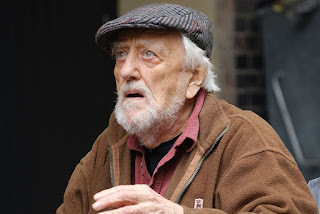 The end of the episode sees the Doctor and Donna reunited with the TARDIS and returning to Camden Market on Earth, where Donna's grandfather, Wilf, is waiting for them. Good old Bernard Cribbins ... one of the best additions to the show back in the day ... and a legend to everyone who grew up in the sixties and seventies ... Sadly this short scene turned out to be his final work and he died shortly after. RIP Bernard ... we'll not see your like again!
The end of the episode sees the Doctor and Donna reunited with the TARDIS and returning to Camden Market on Earth, where Donna's grandfather, Wilf, is waiting for them. Good old Bernard Cribbins ... one of the best additions to the show back in the day ... and a legend to everyone who grew up in the sixties and seventies ... Sadly this short scene turned out to be his final work and he died shortly after. RIP Bernard ... we'll not see your like again! But the ending leads into next week's episode ... people are going mad, attacking each other; a plane crashes ... the world's gone insane! What is happening!!!???

Review: Doctor Who: The Star Beast (2023)
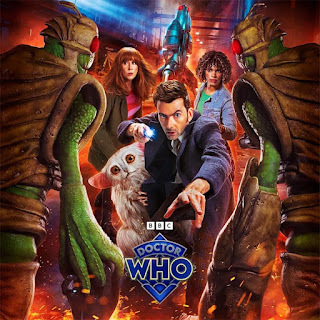 It's back! With a blaze of promotion from BBC Studios, Doctor Who is back on our telly screens ... it's the sixtieth anniversary, and while there has not been perhaps quite as much visible celebration as the fiftieth anniversary, when Matt Smith was piloting the TARDIS, and Peter Capaldi was waiting in the wings (ten years ago ... goodness ...) there has been an awful lot of celebratory fare on BBC iPlayer (including making the entire back catalogue of Doctor Who available, for free, to anyone in the UK who has a TV license) and BBC Sounds (several great archive radio presentations and a pile of new documentaries and explorations of all things Who).
It's back! With a blaze of promotion from BBC Studios, Doctor Who is back on our telly screens ... it's the sixtieth anniversary, and while there has not been perhaps quite as much visible celebration as the fiftieth anniversary, when Matt Smith was piloting the TARDIS, and Peter Capaldi was waiting in the wings (ten years ago ... goodness ...) there has been an awful lot of celebratory fare on BBC iPlayer (including making the entire back catalogue of Doctor Who available, for free, to anyone in the UK who has a TV license) and BBC Sounds (several great archive radio presentations and a pile of new documentaries and explorations of all things Who).But all of this takes second fiddle to the actual show itself ... and here we are ... 2023 ... and the Doctor has regenerated ... into a past face ... why? This question is asked a couple of times in 'The Star Beast' so I assume it has some importance ... Jodie Whitaker as the 13th Doctor, has regenerated into David Tennant, previously the 10th Doctor, and also the Metacrisis Doctor, who is now the 14th Doctor. With an even more bouffant hairdo, and perhaps less manically introspective, Tennant makes a good fist of differentiating this version of the Doctor with the one that came before. It's subtle, but there are variances.
Which is just as well, as he's been teamed up again with Catherine Tate as Donna Noble (now technically Donna Temple as she married, but she still goes by the Noble name). Now poor Donna, the last time we met her, had taken the Doctor's regenerational energies inside herself and become a sort of hybrid Time Lord, the Doctor-Donna. The only way the Doctor could save her was to wipe her memory of ever having met the Doctor, and for her to live her life back on Earth as plain old Donna once more ... ah, but the Doctor also arranged for her to win the lottery so she had millions of pounds to keep her going as well ... it seems she gave all the money away ...
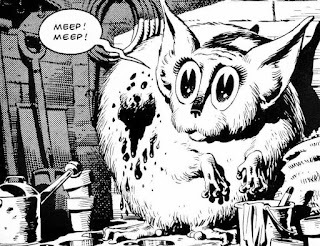 And that's where we sort of enter 'The Star Beast'. There's quite a lot to unpick here as the background is as interesting as the telling ... it all started back in 1979 in several issues of a newly launched Doctor Who Magazine, where a comic strip called 'The Star Beast', written by Pat Mills (and also credited to John Wagner, though Wagner didn't actually write this story) and drawn by Dave Gibbons, ran. This strip was very popular and it was later adapted as an audio by Big Finish ... and obviously Russell T Davies also remembered and liked it, as he got permission to adapt it as a television episode to launch the 14th Doctor's series of adventures.
And that's where we sort of enter 'The Star Beast'. There's quite a lot to unpick here as the background is as interesting as the telling ... it all started back in 1979 in several issues of a newly launched Doctor Who Magazine, where a comic strip called 'The Star Beast', written by Pat Mills (and also credited to John Wagner, though Wagner didn't actually write this story) and drawn by Dave Gibbons, ran. This strip was very popular and it was later adapted as an audio by Big Finish ... and obviously Russell T Davies also remembered and liked it, as he got permission to adapt it as a television episode to launch the 14th Doctor's series of adventures.The idea that Donna must never meet the Doctor again or she will die is laboured by the Doctor several times in the teleplay, and yet fate seems to keep bringing the Doctor into her orbit. First in Camden market where she is shopping with her daughter Rose (Yasmin Finney), 15 years old it seems but with the look and smarts of someone much older. Actress Finney does a great job with Rose though, making the character real and relatable. Then a spaceship crashes overhead and plunges to the ground at an old steelworks, but Donna is picking up her packages and misses it all (as usual).
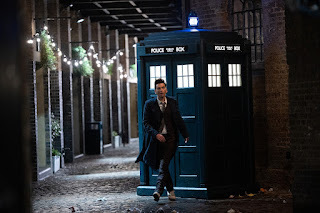 The Doctor gets a lift in Donna's husband's (Karl Collins) cab to the crash site where Shirley Anne Bingham (Ruth Madeley) is introduced as UNIT scientific adviser number 56 and the Doctor says that the Doctor was the first ... what was Liz Shaw then? I thought she was the first Scientific Adviser engaged by UNIT ... hmmm ... is this some timey wimey thing going on ...
The Doctor gets a lift in Donna's husband's (Karl Collins) cab to the crash site where Shirley Anne Bingham (Ruth Madeley) is introduced as UNIT scientific adviser number 56 and the Doctor says that the Doctor was the first ... what was Liz Shaw then? I thought she was the first Scientific Adviser engaged by UNIT ... hmmm ... is this some timey wimey thing going on ...It seems that Rose is being bullied by the kids at school, they taunt Rose with Rose's 'deadname' of Jason, and Donna's mum, Sylvia (Jacqueline King) has trouble getting her head around the fact that Rose is now presenting as a girl - all this came over as very realistic to me ... it's the sort of thing we see and hear day after day in 2023. But back to the plot, and it seems that the spaceship didn't crash, it landed, and it's pilot had ejected, the escape pod landing close to Rose's home, where Rose and her pal Fudge (Dara Lall) - a hangover from the comic strip. In the episode he barely does anything - go to investigate.
And so we meet the Meep (performed by Cecily Fay, voiced by Miriam Margolyes) ... a cute white fluffy alien creature looking like a rather large bush-baby. The Meep seems hurt and scared and so Rose takes the Meep in.
Meanwhile some UNIT soldiers are 'infected' by something from the ship and go all blue-glowey-eyed ...
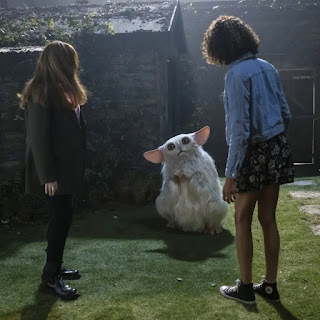 Before you can turn around, there are large insect-like things hunting the Meep (the Wrarth Warriors) and the infected soldiers are hunting the Wrarth Warriors, and they're all at Donna's house ... and so is the Doctor ... so how can Donna be kept apart from him ... OR SHE WILL DIE!!!
Before you can turn around, there are large insect-like things hunting the Meep (the Wrarth Warriors) and the infected soldiers are hunting the Wrarth Warriors, and they're all at Donna's house ... and so is the Doctor ... so how can Donna be kept apart from him ... OR SHE WILL DIE!!!Of course she can't be kept apart and the group escape from the war-like carnage of the battle by use of several new sonic screwdriver functions - handy that device - and head for an underground car park where the Doctor convenes a council of war ... just what IS going on here?
Seems the Wrarth Warriors are not evil - they are using plasma and stun bolts - but the Meep is of course totally corrupt and evil and out to use Earth as the Meep's own larder.
A word on pronouns. There's an awkward scene were Rose has a go at the Doctor for mis-gendering the Meep ... The Meep it seems is always just The Meep, rather than he, she, they or, I suppose, it ... and this just doesn't work. It gets in the way of the action, and just isn't necessary. I guess they felt it was to tie into the whole Rose is trans vibe they wanted to go with, which up to this point was subtle and well handled. The Doctor comments that the Doctor too doesn't have pronouns and is just 'The Doctor' ... hmmm (again).
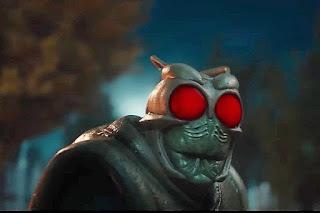 Anyway ... the Meep takes everyone prisoner and they are locked up in the ship until the Meep can decide which to eat first ... and so the Doctor takes matters into the Doctor's own hands, and ushers everyone else out so the Doctor can start flicking switches and the like ... but Donna, to whom realisation is coming, insists on staying behind to help ... so they both start flicking switches as a partition comes down between them (I'm not sure why this happens ... it seemed like a McGuffin to force Donna to full realisation before she could help the Doctor, but it also reminded me of the Doctor and Wilf when Wilf was trapped in the radiation machine and will die ...)
Anyway ... the Meep takes everyone prisoner and they are locked up in the ship until the Meep can decide which to eat first ... and so the Doctor takes matters into the Doctor's own hands, and ushers everyone else out so the Doctor can start flicking switches and the like ... but Donna, to whom realisation is coming, insists on staying behind to help ... so they both start flicking switches as a partition comes down between them (I'm not sure why this happens ... it seemed like a McGuffin to force Donna to full realisation before she could help the Doctor, but it also reminded me of the Doctor and Wilf when Wilf was trapped in the radiation machine and will die ...)So the Doctor and an 'awoken' Donna flick switches and turn off the spaceship which has been causing lava-filled fissures to open up across London. The fissures close up and everything is ok again. Shades of the attack by the giant Racnoss in 'The Runaway Bride' where the Thames is completely drained of water, and is then put back right again with no ill effects!
But Donna is again full of the metacrisis regeneration energy ... and SHE WILL DIE!!
Except ...
Do I need a SPOILER TAG here? Not sure ... so if you've not yet seen the episode ... stop reading here.
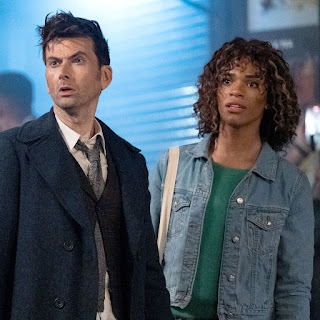 It's clever. Donna was GOING TO DIE!! from the metacrisis regeneration energy but she had a child ... and because of that, the energy could be shared with Rose ... and Rose can cope with this much better than Donna alone can do ... and so Donna and Rose ultimately don't die because they can LET IT GO ... something apparently a man cannot do ... a bit of cringe-worthy sexism thrown in because why not.
It's clever. Donna was GOING TO DIE!! from the metacrisis regeneration energy but she had a child ... and because of that, the energy could be shared with Rose ... and Rose can cope with this much better than Donna alone can do ... and so Donna and Rose ultimately don't die because they can LET IT GO ... something apparently a man cannot do ... a bit of cringe-worthy sexism thrown in because why not.It's a good job that the episode as a whole is so enjoyable and visually rewarding. From the Meep, to the Wrarth Warriors, to the spaceship, to the battle of Donna's street, to the new TARDIS interior we see at the end (and that's interesting as the Doctor acts like the Doctor has not seen it before - the Doctor even mentions that it's changed - so what did it look like at the start of the episode - when the Doctor emerges from the TARDIS we don't see the inside ... maybe it was still like Jodie's? Ahhhh ... another mystery ...) everything looks amazing and moves at pace. You barely have a chance to take in all the detailing which is going on ...
The jeers at Rose from the lads from her school is a blink and you miss it moment - if you happened to sip your tea at that point! I also liked among many other things here, that Rose was making toys based on Doctor Who monsters that Donna had met - proving their shared metacrisis-ism ... we had a Judoon, an Ood, a Dalek, a Cyberman ... stand by for merchandise overload! Also that the little shed which Rose uses as a workshop is also a TARDIS ... subtle but the clues are there.
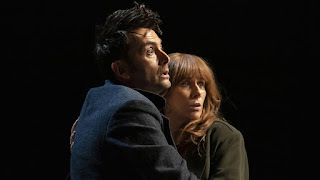 It's something of an exhausting episode, doing many things simultaneously ... introducing the tenth Doctor and Donna, summarising their backstory, introducing Rose as Rose is important to the outcome, introducing UNIT as seemingly fully in control of the alien spaceship incursion - even if Shirley seems a little out of place in her wheelchair. I get that UNIT's scientific adviser may well be wheelchair-bound, but in that case, should she really be physically taken to the front line ... to a warehouse full of stairs and hazards that she might not be able to navigate ...? Wouldn't she have an assistant to help with that perhaps while she stays in a mobile HQ? Even the Brigadier didn't physically attend every UNIT activity! Having said that, she seems a mean hand with her augmented chair with integrated darts and rocket launcher, so who's to say that the chair can't also hover and allow her to go wherever she pleases ...
It's something of an exhausting episode, doing many things simultaneously ... introducing the tenth Doctor and Donna, summarising their backstory, introducing Rose as Rose is important to the outcome, introducing UNIT as seemingly fully in control of the alien spaceship incursion - even if Shirley seems a little out of place in her wheelchair. I get that UNIT's scientific adviser may well be wheelchair-bound, but in that case, should she really be physically taken to the front line ... to a warehouse full of stairs and hazards that she might not be able to navigate ...? Wouldn't she have an assistant to help with that perhaps while she stays in a mobile HQ? Even the Brigadier didn't physically attend every UNIT activity! Having said that, she seems a mean hand with her augmented chair with integrated darts and rocket launcher, so who's to say that the chair can't also hover and allow her to go wherever she pleases ...
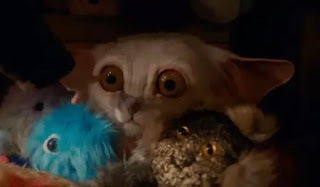 Overall I thoroughly enjoyed this episode. It told a proper story, and was exciting and thrilling at all the right places. While I also really enjoyed Matt Smith and Peter Capaldi's episodes - and some of them I love to pieces! - with Jodie's stories there was always something missing, some spark, some depth ... and now we have Russell T Davies back at the helm, the spark seems to have returned in spades.
Overall I thoroughly enjoyed this episode. It told a proper story, and was exciting and thrilling at all the right places. While I also really enjoyed Matt Smith and Peter Capaldi's episodes - and some of them I love to pieces! - with Jodie's stories there was always something missing, some spark, some depth ... and now we have Russell T Davies back at the helm, the spark seems to have returned in spades.But we only have (allegedly) three episodes of this new 14th Doctor and Donna combination before it's all change again ... and next week ... well ... there wasn't a trailer at the end for 'Wild Blue Yonder', a story they have been keeping so tightly under wraps that one wonders if anyone has actually seen it at all ... including Davies! Only one week to wait ...
Review: Rose : Illustrated Novelisation (2023)
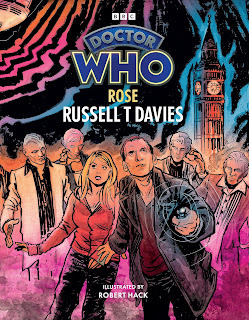 Following on from 2022's acclaimed illustrated novelisation of the first Dalek story, Doctor Who in an Exciting Adventure With the Daleks, illustrated by artist Robert Hack, the same team have come together to present a new edition of Russell T Davies' novelisation of his script for the opening episode of the revived series in 2005.
Following on from 2022's acclaimed illustrated novelisation of the first Dalek story, Doctor Who in an Exciting Adventure With the Daleks, illustrated by artist Robert Hack, the same team have come together to present a new edition of Russell T Davies' novelisation of his script for the opening episode of the revived series in 2005.Rose follows the same pattern: an oversized hardback edition containing the original text of Davies' novelisation, but augmented with many new illustrations from Hack which complement and augment the story wonderfully.
Among the gems here are a selection of very creepy shop mannequins, gorgeous imagery from the show itself, and, possibly my favourite, two double page spreads showing, first, all the Doctors we know about, and second, all the ones we don't know about, or which might just be as a result of Clive misunderstanding or getting the wrong end of the stick (ie not Doctors at all).
Even the pages which don't have obvious imagery, have a colour wash to the pages, and sometimes there's a faint hidden image in the wash too ... it's all beautifully done and put together, and is a real treat on the eyes as well as the senses, with the smashing dust jacket, thick paper leaves, and general sense and feel of it being a quality item.

After the massive disappointment of the new Whotopia book, it's right that the BBC have given Rose pride of place as the 60th anniversary publication, releasing it on the anniversary day itself. This is a publication which celebrates quality: a great story bringing Doctor Who to a whole new audience, a cracking adaptation by the original writer, and a quality publication from the BBC, containing some of the best modern art created for the show.
You couldn't ask for anything else!
November 24, 2023
Review: The Daleks: In Colour (2023)

This colourised version of the very first Dalek story, here called 'The Daleks' but actually titled 'The Mutants' by the production team at the time of transmission, sounded interesting. There's been a 'thing' about colourising black and white productions for some time, with everything from old scifi films of the 50s to episodes of old Laurel and Hardy comedies getting the treatment. Fans have been posting coloured clips from Doctor Who on YouTube for years with varying results, of course some episodes of Doctor Who which were originally in colour but for which only black and white prints existed have been colourised via a variety of clever means, and more recently AI has been used to apply colour to clips, again with varying degrees of success.
Add to this people like Clayton Hickman who has been superbly colouring black and white photos, and you have a lot of talent out there who should be able to produce something passable - at least if the BBC is then going to show it to the public!
So a colourised version of 'The Daleks' seemed like a good idea! But then we heard that it was also an edited version ... cut from seven 25 minute episodes (175 minutes) down to around 75 minutes ... so losing 100 minutes of runtime! Moreover, it was to have new dialogue from both David Graham, one of the original Dalek voices, and now 98 years old, and Nicholas Briggs, who has provided the voices for the modern Daleks ever since 2005. But there's more ... Mark Ayres, custodian of the BBC Radiophonic Workshop's material and member of that amazing group of musicians, was to provide a new score ... Hmmm ... Now it starts to sound all a bit much.
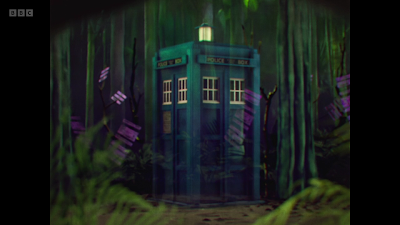
Then we have Exec Producer Russell T Davies, telling us that it's all to try and make these old black and white Doctor Whos accessible to the new generation who won't watch black and white stuff ... so it needed to be edited down, made snappier and faster, using modern techniques and so on ... which all sounded good. The edit was undertaken by Benjamin Cook, writer for probably 90% of Doctor Who Magazine's Nu-Who content, and who also collaborated with Davies on his book of script development for the show. He's also done trailers for the BluRay collections and such for the series before ...
So ... a new version of the iconic first appearance of the Daleks ... was it any good?
It's always really hard to review items where friends have been involved, but as I am a reviewer/commentator on Doctor Who, and as I believe in not whitewashing things, I have to say what I think ...
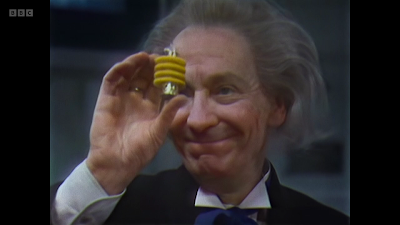
Overall: I enjoyed it. I think it manages to achieve what Davies wanted: to act as a new version of the story for new fans (or ones who just won't sit through 175 minutes of black and white television). But it is definitely a new take on the story. In the same way as the animated episodes take enormous liberties with the source material to present a totally different look and feel to the episodes (even though they have the same soundtrack), this version of 'The Daleks' takes the basic storyline and removes anything which is extra to that ... But it sort of works ... it's fast and furious and moves at pace.
The colourisation is okay ... but there was always going to be conflict as to what colour things should be. Should they be the colour they were in the studio, as evidenced by colour photographs taken at the time? Or should they be the colour which perhaps they might have been otherwise? The issue is that in the black and white days, the designers coloured things so that the shade of grey they would then appear on screen would work with all the other shades of grey in the production. This is why the TARDIS control console was actually coloured a pale green, so that it looked a silver white on screen ...

It seems that they've done a bit of a mixture ... the TARDIS console has been coloured a silvery white, so following the intention rather than the actuality ... but the TARDIS floor (and indeed the floor of the Dalek city are a blue - the colour of the actual set floors. The strangest colour decision comes with Barbara's top ... this is a bright pink ... and while the actual colour of the top she wears at the start of the story is unknown, the one she wears at the end was actually pale blue.
In the original story, after the Thals are killed in the Daleks' ambush, the TARDIS team return to the ship in episode 4, and Barbara then changes her outfit. The original top, which was a sort of button-up-the-back blouse, is replaced with a shirt at this point, but she still wears her skirt. In episode 5, when they are on their way to the mountains through the swamps, she has now changed her skirt for a pair of black Thal trousers. In the edited version, Barbara's outfit changes as before ... but her shirt remains a bright pink ... Ian's jumper is also the wrong shade of brown - it's too light and should be darker, as should his trousers.

Overall though the colour choices are not bad and help to enhance the story. There's some lovely elements of coloured skies and the control panels in the Dalek city are smashing. Some of the darker shots suffer from a lack of clarity and black 'artefacts' appear around the edges of the black areas - especially noticeable in the scene immediately before the travellers meet the Daleks for the first time. At least on my big television they do!
And the Daleks. Well they look amazing. Correct colour scheme, and as in studio too. I love the new extermination effect too. The main issue with them are the voices. Nicholas Briggs' modern more strident tones stand out a mile from the original, more subtle, voices. And it grates. Especially as the very first Dalek voice we now hear is new: 'Stay where you are!' rather than the original 'You will move ahead of us and follow my directions!' Whether this new voice is a new Graham or Briggs contribution, it really doesn't work.
And this brings the next element of the production to the fore: the music. The original had a brilliantly futuristic and distinctive score by Tristram Cary, but here several key cues have been changed and new music written ... in the case of the first appearance of the Daleks, instead of a sort of long whistle as the camera pulls back, now we have more modern music added in to make it 'dramatic'. The music overall is OK, though I frowned when I heard that the opening title music had been tinkered with, but in places it is jarring - like the addition of a sort of disco beat as the travellers escape in the lift: this reminded me a little of the music in the two Dalek cinema films. There were more cues from Cary's work used also: it sounded to me like his scores for some of the other Doctor Who stories he did had been plundered (but then I have a feeling that the future scores were mostly reuses of the cues for 'The Daleks' anyway).
Either way this doesn't really matter in my ear, as they're all from the same composer and match together. It's the more modern elements with drums and guitar sounds which seemed out of place in the story ... perhaps it's what the modern viewer needs: the music to 'tell' them what to feel at each point. If so it's a shame, and, for me, detracts from the drama that is unfolding. I often feel with music that less is more ... I dislike the 'wall to wall' music landscape of modern shows, much preferring the ambient and subtle approach to scoring a film or a show. There's an adage that if you notice it, then it hasn't worked. And here I noticed it big-time.
Back to the edit, and it's inevitable that there would be some sacrifices. I understand the need for shortcutting some of the storytelling, and using the Daleks watching on their rangerscopes was a nice way to speed the plot along. It is a shame that we lost the appearance of the first ever alien monster to appear on Doctor Who: the poor Magnadon. And the food machine sequence too. I guess you can't have everything. It was also an odd, but perhaps predictable decision to show the TARDIS arriving on Skaro, scenes never in the original story (the first time we saw the TARDIS materialise was in 'The Keys of Marinus'), and the new scene here looks very strange. I suspect it was achieved through CGI, and unfortunately it looks like it. Likewise they have replaced the shot of the TARDIS dematerialising at the end with a modern equivalent ... and again it jars. Why do they have the TARDIS sort of vanishing then reappearing, then vanishing, then reappearing in time with the sound effect? At the start of 'The Keys of Marinus', the TARDIS just silently and smoothly fades into view. It also silently and smoothly vanishes at the end of 'The Keys of Marinus', and smoothly appears at the start of 'The French Revolution'. In the original shot at the end of 'The Daleks' it also smoothly vanished ... so why this up/down visual approach? It's a strange decision to have made.
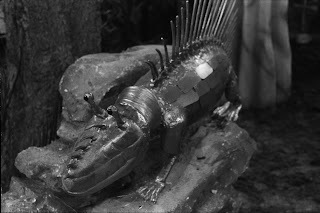 A Magnadon. Yesterday.
A Magnadon. Yesterday.Other anachronistic elements include the tolling of the Cloister Bell as the TARDIS has it's little hiccup at the start: this sound was not introduced until 'Logopolis' in 1980.
Overall then, a story from Doctor Who's very beginning has been given a new life through a 2023 'makeover', with almost all elements of the production re-edited, scored, coloured and jigged to create a modern take on a certified classic. It's not perfect, but then I wonder if anything like this really could please everyone. Maybe a straight colourisation would be better ... but then you have an arguably stodgy sixties pace to try and deal with ... and there's still the question as to which colours to use - especially when some stories have little or no original colour material to work from.
Like the animations, or indeed the two Dalek cinema films, this is best viewed as an alternative take on the story, with a tweaked plot, new music, and colours occasionally so bright they make your eyes bleed ... I think there is room in the world for both/all versions. It'll be interesting to see which one(s) are attempted next!
THE DALEKS IN COLOUR can be seen on iPlayer in the UK: https://www.bbc.co.uk/iplayer/episode/m001snnz/doctor-who-19631996-season-1-the-daleks-in-colour



